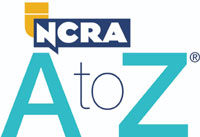NCRA, the country’s leading organization representing stenographic court reporters, captioners, and legal videographers, offers the six-week program online with Live Zoom three times a year, or as an Asynchronous On-Demand Program. The program offers participants the opportunity to learn the fundamentals of steno machine shorthand through a basic introduction of letters and numbers. Participants can also determine if a career in the stenographic profession is right for them.
“I thoroughly enjoyed this program,” said Tabitha Graham of Lola, Kan., one of 885 program participants to finish the course in 2024. “I am so excited to continue this journey, and this has equipped me with the foundation that I needed to truly decide to pursue this as a career.”
NCRA A to Z program graduate Clifford Mack, who also completed the program in 2024, said her interest in steno started back in her youth while growing up in Fayetteville, N.C. “I remember becoming curious about the lady [using] this very interesting machine during a courtroom proceeding. At my age then, I had no idea what the profession was called, let alone who to talk to or how to gather information. So life went on; and like anyone else, I worked under many capacities [and] even obtained a bachelor’s degree in communication from Fayetteville State University,” she said.
“Fast forward. I was presented with an opportunity that I know without a doubt was destiny. Just this past summer my supervisor returned from jury duty and handed me a flyer [that read] “Wanted: Court Reporters.” I knew instantly that I was finally getting my chance to pursue something I discovered interest in as a child, hence the saying ‘If it’s meant to be, it will be.’ Once I found out there was a shortage in the profession, I hit the ground running, taking the time to research, network, connect [and] email,” she added.
“I’d like to express my gratitude and appreciation to the entire organization for creating a program that gives those like me a head start into steno. From the handbook and instructional videos to the positive and supportive affirmations at the end, it is extremely helpful. I highly encourage anyone that is just a little bit interested in stenography to enroll in the free NCRA A to Z online program. I am excited to enroll in a program and continue my steno journey,” Mack noted.
In May, People magazine profiled the journey into court reporting of NCRA member Allegra McKenna from Chalfont, Pa., who completed the A to Z program and recently graduated from the Community College of Allegheny County in Pittsburgh, Pa. The article notes that McKenna, dropout from a four-year college, is on her way to earning a six-figure salary as a court reporter.
More information about the free six-week NCRA A to Z Intro to Steno Machine Shorthand program, including how to register, can be found at DiscoverSteno.com, or by emailing atozprog@ncra.org.
Students who move on from the NCRA A to Z program to a stenographic court reporting program at one of NCRA’s approved schools also have the opportunity to apply for an array of scholarships and grants to aid them in supporting their studies, as well as their entry into the profession.
Court reporters and captioners rely on the latest in technology in using stenographic machines to capture the spoken word and translate it into written text in real time. These professionals work both in and out of the courtroom recording legal cases and depositions, providing live captioning of events, and assisting members of the deaf and hard-of-hearing communities with gaining access to information, entertainment, educational opportunities, and more.
If you are looking for a career that is on the cutting edge of technology, offers the opportunity to work at home or abroad, like to write, enjoy helping others, and are fast with your fingers, then the fields of court reporting and captioning are careers you should explore.
To arrange an interview with a working court reporter, captioner, or a current court reporting student, or to learn more about the lucrative and flexible court reporting or captioning professions and the many job opportunities currently available, contact pr@ncra.org.
For questions regarding the program, please email Lisa Dennison, NCRA A to Z Program Coordinator at atozprog@ncra.org.
The National Court Reporters Association (NCRA) has been internationally recognized for promoting excellence among those who capture and convert the spoken word to text for more than 125 years. NCRA is committed to supporting its more than 12,000 members in achieving the highest level of professional expertise with educational opportunities and industry-recognized court reporting, educator, and videographer certification programs. NCRA impacts legislative issues and the global marketplace through its actively involved membership.
The U.S. Bureau of Labor Statistics reports that the court reporting field is expected to be one of the fastest areas of projected employment growth across all occupations. In addition, Forbes has named court reporting as one of the best career options not requiring a traditional four-year degree.


